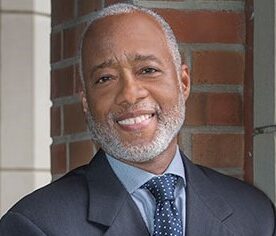Honoring scientists who have made important and lasting contributions to the sciences of mind, brain, and behavior.
FABBS mourns the devastating loss of Norman B. Anderson, PhD, who passed away entirely too young on March 1, 2024. Dr. Anderson had just officially begun his term as FABBS President-elect and had already made significant contributions to the mission of FABBS, providing insight and counsel to our board, leadership, and colleagues.
Dr. Anderson was born on October 16, 1955, in Greensboro, NC. His parents were the late Drs. Charles W. and Lois J. Anderson, who were co-pastors of United Institutional Baptist Church in Greensboro. He is survived by his wife, Elizabeth, and his extended family.
Dr. Anderson leaves a remarkable legacy in the behavioral sciences. He is well-known for his research and writing on racial, ethnic, and economic health inequities. In addition to his impactful research contributions and esteemed faculty positions, he served in many national leadership positions in the field, including as the inaugural Director of the Office of Behavioral and Social Sciences Research at the National Institutes of Health, as the second longest serving (and first African American) Chief Executive Officer of the American Psychological Association, and as President of the Society of Behavioral Medicine.
In a statement to FABBS, Dr. Anderson recounted his experience in Washington, DC. “My interest in policy and advocacy related to the behavioral, social, and brain sciences began around 1994 while I was a faculty member at Duke University School of Medicine. I was invited by the APA Science Directorate to provide testimony to one of the congressional appropriations sub-committees. That was a whirlwind day…testifying on Capitol Hill (for the first time), and later visiting some of the leaders at NIH. This was the day that I caught the ‘science advocacy and policy bug.’” Approximately one year after that day in Washington, Dr. Anderson was selected as the first Director of the NIH OBSSR, and later as CEO of APA, two roles in which he served for nearly two decades. His special interest at NIH was in sociocultural determinants of health, and in advancing an integrated, transdisciplinary, bio-psycho-social approach to health science, health promotion, disease prevention and health care.
Dr. Anderson will be remembered by his colleagues for his kindness, wisdom, mentorship, humility, and friendship. “Norman was a major scientific figure and a tireless supporter of the behavioral and brain sciences—particularly their application to improving the human condition. I was honored and excited to be embarking on this FABBS collaboration with him, and I am deeply saddened that the work was cut short just as we were getting underway,” said Dr. Jeffrey Zacks, FABBS President.
Dr. Philip Rubin, FABBS Past President, said of Dr. Anderson, “I knew Norman Anderson for about thirty years. First when he was the inaugural Director of OBSSR, then when he was the CEO of the APA, and most recently when I encouraged him to consider becoming a future President of FABBS. He did so, and became the President Elect of FABBS in January, 2024, with his term as President to begin in 2026. I saw him in February and was shocked and devastated to learn of his death. I was always impressed by his intelligence, expertise, kindness, and warmth. This is a great loss to our communities and to our nation. Most importantly, my heart goes out to his family, friends, and colleagues. He will be missed. May his memory be a blessing.”
“Norman had a unique combination of off-the-charts professional accomplishments besides humility and kindness. He was wise and thoughtful, supportive, and generous with his time, and insights,” said Juliane Baron, FABBS Executive Director.
Dr. Anderson received his bachelor’s degree from North Carolina Central University, and his master’s and doctoral degrees in clinical psychology from UNC Greensboro. Anderson served as a clinical resident at Brown University School of Medicine and as a post-doctoral research fellow at Duke University School of Medicine. He received several significant awards from scientific societies and universities for his research, service, and leadership. Among his numerous honors, Dr. Anderson was elected to membership in the prestigious National Academy of Medicine of the National Academies of Science and was inducted into the National Black College Alumni Hall of Fame for his work in science.
